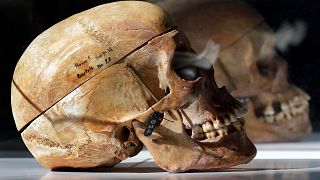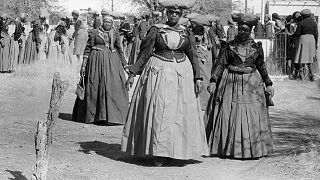Namibia
Namibia began voting on Wednesday with the country expecting a change in ledership and governance.
About 1.4 million people — approximately half the Namibian population — are registered to vote to decide the president and the makeup of Parliament for a five-year term.
A total of 15 candidates are running for president including Netumbo Nandi-Ndaitwah is the current vice president and the ruling SWAPO party's candidate.
She's already in the lead after the results of special early voting among citizens overseas and the armed forces were announced earlier this month.
But SWAPO, which has governed the southern African country and held the presidency for 34 years since independence from apartheid South Africa in 1990, faces growing frustration caused by high unemployment and economic hardship, especially among young people.
Another candidate is Panduleni Itula, a former dentist who was SWAPO’s closest challenger four years ago when he ran as an independent. He is representing the Independent Patriots for Change party this year. A runoff will be held if a candidate doesn’t win more than 50% of the votes, which has never happened before in Namibia.
Polls close at 9 p.m. (1900 GMT) and results are expected by the weekend.
The country on the southwestern coast of Africa is a former German colony that came under South African control after World War I and its Black majority was later subjected to some of South Africa's apartheid policies. SWAPO was at the forefront of the battle for independence.
Botswana's ruling party lost in a landslide last month after 58 years in power since independence from Britain, and Mauritius delivered a surprising heavy defeat for its incumbent party this month.
Mozambique's long-ruling Frelimo party was declared the winner of an election in October, prompting claims of vote rigging and sparking ongoing violent protests against the party.
President Hage Geingob died in office in February and Geingob's vice president, Nangolo Mbumba, became head of state.
Issues affecting women, including reproductive rights, equal pay and health care, are also likely to rank high for voters in a country that has the Kalahari Desert running through its center and the Namib Desert along its coast and has one of the sparsest populations in the world. Just over 3 million people live in Namibia, which is more than twice the size of Germany.
Those deserts make it one of the driest countries in southern Africa that's vulnerable to climate shocks, like an El Nino-induced drought that parched the region this year. As a result, Namibian authorities announced they would kill hundreds of wild animals to provide food for hungry people.













Go to video
Former South African deputy president David Mabuza dies at 64
01:05
South Africa: year of power marred by new scandal in coalition government
Go to video
’Black Empowerment’ law stalls Elon Musk's $113 million investment in SA
01:30
Uncertainty looms over Nissan South Africa as global restructuring continues
02:19
South African actor Embeth Davidtz makes directorial debut with Rhodesia-set drama
00:56
South Africa: At least 101 dead in Eastern Cape floods as rescue efforts continue